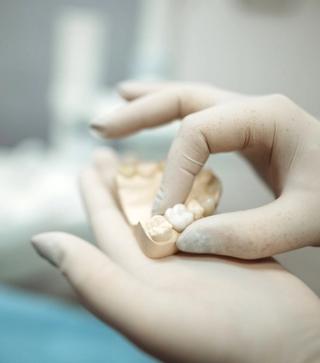
Dental crowns are an effective way to repair a compromised or damaged tooth, and they have several key benefits to your oral health. A crown can make the difference between preserving a natural tooth and having it extracted.
What is a dental crown?
A dental crown is a thin, custom-made cover that snugly encases your existing tooth, adding strength, protecting your natural tooth, and enhancing its aesthetic appearance.
Dental crowns are usually made from porcelain, which is a very strong material that can be matched to your natural tooth colour. However, you will also have the choice of a dental crown made from gold, which doesn’t have the same natural look, but does offer added strength - that’s why gold is usually used for back teeth that can’t be seen when you smile, but do more of the heaving lifting when it comes to chewing.
A dental crown is usually required when your natural tooth is weakened, broken or damaged in some way. For example, many people who have a root canal treatment will get a dental crown placed over the tooth for added strength.
A dental crown can also be an aesthetic treatment for stained or misshapen teeth. For example, if a tooth is discoloured, a dental crown can be fitted over the natural tooth for a whiter smile if standard teeth whitening is not sufficient.

Advantages of a dental crown
A crown is an excellent solution to several problems and offers a variety of advantages.
- Protect a weak or damaged tooth: The key advantage of a dental crown is that it strengthens your tooth, avoiding further damage or issues that could arise due to a weakened tooth.
- Improved appearance: Dental crowns can cover misshapen or discoloured teeth for a brighter, whiter smile you can be confident in.
- Long lasting: With the right care, a dental crown is a long-lasting solution that you can forget about after you get it.
If you think a dental crown could be the right solution for you and would like to discuss your options with a dentist, we are here to help.
Get in touch with our friendly team to schedule an appointment.
Frequently asked questions
No, getting a dental crown is not painful as your dentist will give you a local anaesthetic to numb the area.
It may be uncomfortable to sit in the chair with your mouth open during treatment, but you can put your hand up for a break at any time.
Yes. A dental crown can greatly improve the strength, health, and appearance of your natural tooth. It is a good solution for several issues, so be sure to discuss getting a crown with your dentist.
They may be able to offer alternative solutions such as dental veneers, or explain why a crown is the best option for your needs.
A dental crown varies depending on factors such as the material, how many crowns you’re getting, and the extent of work required to install the crown. Please get in touch with our friendly team for more information.
Getting a dental crown is a common and highly safe procedure. The most common side effects are tenderness around the site following each procedure, which will go away in a day or so and can be managed with over-the-counter pain medication in the meantime.
It is also possible to experience discomfort when the anaesthesia wears off. In this case, you will need to visit your dentist as soon as possible, as the crown may need to be better shaped to your tooth. This is not a common side effect but is something to be aware of.
Over time, your dental crown may chip, break, or even come off. This is not common but can happen due to wear and tear, and can largely be avoided with good care. Should this occur, your dentist will either fix and reattach the crown or have a new one made.
Dental crowns are a permanent solution, but they can wear down over time. Typically, crowns will last in the decades, for at least 20 years before showing signs of wear and tear.
Should your crown fail, it is a simple matter of having it replaced with a new one.
Good care, including good dental hygiene habits and avoiding hard sweets or biting hard materials, will help your dental crown to last as long as possible.

